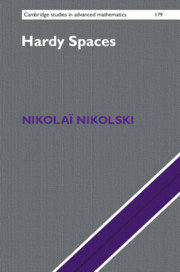2 results
3 - The Smirnov Class D and the Maximum Principle
-
- Book:
- Hardy Spaces
- Published online:
- 25 January 2019
- Print publication:
- 31 January 2019, pp 82-105
-
- Chapter
- Export citation

Hardy Spaces
-
- Published online:
- 25 January 2019
- Print publication:
- 31 January 2019

